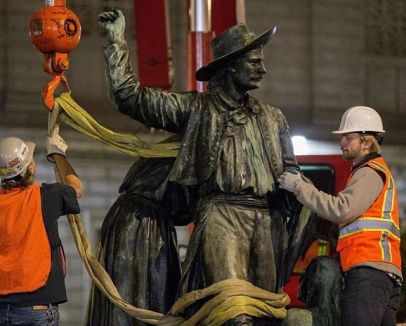Some people write poetry. Others write about poetry. I write about poets, among other people and living things. This week, San Francisco remains in the throes of celebrating poet, painter, and publisher, Lawrence Ferlinghetti who turns 100 years old on March 24. He is indeed a person and a cause worthy of an extended celebration: A champion of art not only in his own work on the page, but at every opportunity he gets to speak publicly about the City, and as proprietor of City Lights, the bookstore he founded in 1953. There has been and will be much more written about Ferlinghetti as we move into his birthday month’s second half and upon the publication of his new novel Little Boy (pure poetry); I’ll leave it those better qualified to speak to his influence. I can however report firsthand that last Sunday, on an unseasonably sunny and warm day, poet laureates past and present and assorted other people crammed into the cave-live Koret Auditorium at the San Francisco Public Library for a long afternoon of reading and speechifying in the name of Ferlinghetti’s centennial. There were some laughs and appreciation, but it was largely the kind of event that Ferlinghetti himself might have described as a gathering of “all you poet’s poets writing poetry about poetry.” I mean, I don’t know, I’m just going by what he’s written and what the poet’s poets said about him that day (at some point I lost altitude — not enough air in there).
As Ferlinghetti’s celebration continues, and in anticipation of poetry month in April and well, just because I can, I’ll point you to four recent profiles I’ve compiled about the lives of poets from our City of Poets. All are in some way connected to Ferlinghetti’s legacy.
In this week’s San Francisco Examiner, I profiled Josiah Luis Alderete, a Spanglish speaking poet with North Beach roots and a Mission District corazón. An amazing performer, his pieces with titles like Claudia Patricia Gomez Gonzalez and Pinche Piñata will set you straight. Read his story here
Kim Shuck is San Francisco’s seventh and current poet laureate: She is a tireless artist, educator, activist and advocate. Her poems make racist statues disappear. Read her story here
Alejandro Murguía was San Francisco’s sixth poet laureate and is the de facto poet laureate of the Mission District. His personal story spans beyond poetry and our city limits, from the bracero camps to the war in El Salvador. Read his story here
Finally, Tongo Eisen-Martin has been reading and resisting across the country the last couple of years. If you’ve had the good fortune to hear him recite his poems in person, then you know. He’s done some deep research into extrajudicial killing of Black lives and his poetry is alive on arrival. Read his story here
None of the tellings of the stories of these poets and their lives would be possible without the poets themselves, The City of San Francisco, The San Francisco Examiner and its photographer Kevin Hume, and the independent booksellers of the Mission District (particularly Modern Times Bookstore Collective, where I was lucky enough to make the acquaintance of these extraordinary artists). Thank you to everyone involved in making San Francisco’s poetry community exceptional and accessible. And oh yes: A hearty thank you and a very Happy Birthday, Mr. Ferlinghetti. Your insurgent poetry continues to inspire we who are waiting for the rebirth of wonder with you.
Filed under: anti-capitalist, anti-war, Arts and Culture, Poetry, San Francisco News, Uncategorized, Alejandro Murguía, City of Poetry, Josiah Luis Alderete, Kim Shuck, Lawrence Ferlinghetti, San Francisco Poetry Renaissance 2, Tongo Eisen-Martin







 editor of anthologies and contributor to countless publications and journals, Kim is part Cherokee, part Polish, and is a fifth generation San Franciscan currently living in the Castro District.
editor of anthologies and contributor to countless publications and journals, Kim is part Cherokee, part Polish, and is a fifth generation San Franciscan currently living in the Castro District.